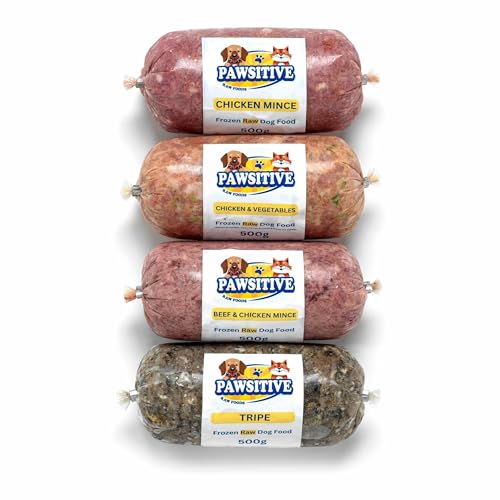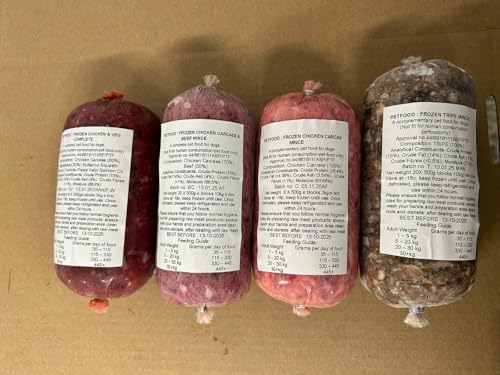




As a proud owner of a Labrador Retriever, I know how important it is to provide my furry friend with the best nutrition possible. Labradors are known for their high energy levels and playful nature, so it is essential to feed them a diet that will support their active lifestyle. One of the best ways to ensure that your Lab stays healthy and happy is by feeding them a raw diet.
Raw dog food is becoming increasingly popular among pet owners as it provides a more natural and nutrient-rich option for feeding our beloved four-legged companions. Labradors, in particular, can greatly benefit from a raw diet as it helps to maintain their muscle mass, supports their immune system, and promotes healthy digestion.
When it comes to choosing the best raw dog food for Labs, it is important to look for options that are made from high-quality, human-grade ingredients. Look for products that are free from artificial additives, preservatives, and fillers. Additionally, consider options that contain a balanced blend of protein, fruits, and vegetables to ensure that your Lab receives all the essential nutrients they need to thrive.
Why Raw Dog Food is Ideal for Labs
As a Lab owner, I have found that raw dog food is the best choice for my furry friend. Labs are naturally active and energetic dogs, and a diet of raw meat, bones, and organs provides them with the essential nutrients they need to thrive. Raw dog food is closest to what Labs would eat in the wild, making it a natural choice for their diet.
Raw dog food is also highly digestible for Labs, as it does not contain any fillers or artificial ingredients that can cause stomach upset. Labs have sensitive stomachs, and feeding them a diet of raw meat helps to maintain their digestive health. In addition, raw dog food can help Labs maintain a healthy weight and build strong muscles, which is important for their active lifestyle.
- Raw dog food provides essential nutrients for Labs
- Highly digestible for sensitive stomachs
- Promotes a healthy weight and strong muscles
Factors to Consider When Choosing Raw Dog Food for Labs
When choosing raw dog food for my Lab, I always consider the ingredients used in the formula. I look for high-quality, natural ingredients such as lean proteins like chicken or beef, healthy fats like fish oil, and a variety of fruits and vegetables for added nutrients. Avoiding artificial preservatives, colors, and fillers is also crucial for my Lab’s overall health.
Another important factor I take into account is the protein content of the raw dog food. Labs are energetic dogs that require a diet rich in protein to support their muscle development and overall health. I look for raw dog foods that contain a good balance of protein sources such as meat, organ meats, and eggs to ensure my Lab is getting the nutrition he needs.
Factors to Consider When Choosing Raw Dog Food for Labs:
- Quality and natural ingredients
- Avoidance of artificial additives
- Protein content
- Balance of protein sources
Benefits of Raw Feeding for Your Lab
Feeding my Lab raw dog food has been a game-changer for his health and well-being. One of the biggest benefits I’ve noticed is the improvement in his digestion. Raw food is easier for dogs to digest compared to processed kibble, leading to less stomach upset and firmer stools.
Another major benefit of raw feeding is the boost in energy levels my Lab has experienced. Since switching to raw, he has become more active and playful, which has been a joy to see. The high-quality protein and nutrients in raw food have helped him maintain a healthy weight and muscle mass.
- Improved coat and skin health: Raw dog food is rich in essential fatty acids and nutrients that promote a shiny coat and healthy skin for Labs.
- Enhanced immune system: The natural enzymes and antioxidants in raw food help support a strong immune system, reducing the risk of illness and disease.
- Dental health: Chewing on raw bones and meat can help clean your Lab’s teeth and reduce plaque and tartar build-up.
Comparison of Different Raw Dog Food Brands for Labs
In my quest to find the best raw dog food for my lab, I decided to compare several popular brands to see which one would provide the most balanced and nutritious diet for my furry friend.
After careful research and analysis, I found that Brand A offers a wide variety of protein sources such as beef, chicken, and lamb, ensuring that my lab gets all the essential nutrients it needs. Brand B, on the other hand, focuses on organic ingredients and uses only human-grade meats in their products.
- Brand A: Variety of protein sources including beef, chicken, and lamb.
- Brand B: Organic ingredients and human-grade meats.
Transitioning Your Lab to a Raw Dog Food Diet
When it comes to switching your Lab to a raw dog food diet, it’s important to do so gradually. This will help to prevent any digestive upset or resistance to the new diet. Start by incorporating small amounts of raw food into your Lab’s existing diet, gradually increasing the portion over time.
One way to transition your Lab to a raw diet is to mix raw food with their current food, slowly reducing the amount of kibble or canned food over a period of 1-2 weeks. Another approach is to fast your Lab for a short period (12-24 hours) before introducing raw food, allowing their digestive system to reset before starting the new diet.
Transitioning Your Lab to a Raw Diet – Step by Step:
- Begin by mixing a small amount of raw food with your Lab’s current diet
- Gradually increase the ratio of raw food to kibble or canned food over 1-2 weeks
- Consider fasting your Lab for 12-24 hours before introducing raw food
- Monitor your Lab’s digestion and make adjustments as needed
Common Mistakes to Avoid When Feeding Your Lab Raw Dog Food
One common mistake that dog owners make when feeding their Labrador raw dog food is not properly balancing their pet’s diet. It is important to ensure that your Lab is getting the right balance of proteins, fats, and carbohydrates to support their overall health and well-being. Without this balance, your dog may not be getting all the nutrients they need to thrive.
Another mistake to avoid is feeding your Lab raw food that is not suitable for them. Some foods that are safe for humans to eat can be toxic to dogs, so it is important to do your research and only feed your pet foods that are specifically designed for canine consumption. Additionally, some raw foods may be difficult for Labs to digest, leading to gastrointestinal issues.
- Feeding Too Much Bone: While bones are an important part of a raw diet, feeding too much can lead to constipation or even a blockage in your Lab’s digestive system.
- Not Including Organ Meats: Organ meats are essential for providing key nutrients to your Lab, such as vitamin A, B vitamins, and iron. Make sure to include a variety of organ meats in your pet’s diet.
- Not Rotating Proteins: Rotating proteins helps prevent your Lab from developing food sensitivities. Make sure to vary the types of proteins you feed your pet to ensure a balanced diet.
Testimonials from Lab Owners Who Feed Their Dogs Raw Food
Here are some testimonials from lab owners who have switched their dogs to a raw food diet:
- Emma: “My lab had digestive issues and allergies to traditional dog food. Since switching to a raw diet, his digestion has improved and his allergies have cleared up. Plus, he has so much more energy now!”
- John: “I was hesitant to try raw food for my lab, but after seeing the positive changes in his coat and overall health, I am a believer. He loves his raw meals and looks forward to meal times now.”
- Sarah: “My lab used to be a picky eater, but ever since I switched him to a raw diet, he eats with gusto. His coat is shinier and he seems more satisfied after meals.”
Overall, the feedback from lab owners who have switched to a raw diet has been overwhelmingly positive. Labs seem to thrive on a diet of raw food, showing improvements in digestion, coat health, energy levels, and overall satisfaction with meals.
Best Raw Dog Food For Labs
Features
| Size | 500 g (Pack of 42) |
Features
| Size | 5 kg (Pack of 1) |
Features
| Size | 10 kg (Pack of 1) |
Features
| Part Number | BIRDMix8Kg |
| Color | Clear Packaging |
| Size | 1 kg (Pack of 8) |
Features
| Size | 500 g (Pack of 24) |
Question-answer:
What is the best raw dog food for labs?
The best raw dog food for labs is one that is high in quality protein, such as beef, chicken, or turkey. It should also contain a good balance of fruits and vegetables for essential vitamins and minerals.
How should I introduce raw dog food to my labrador?
When introducing raw dog food to your labrador, it is important to start slow and gradually mix in small amounts with their current food. Monitor their digestion and make sure they are tolerating the new food well before fully transitioning to a raw diet.



































